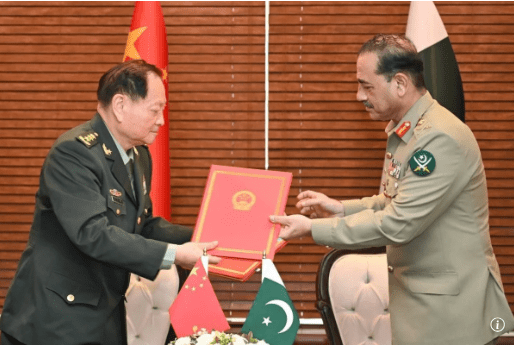As they combat terrorists in opposition to the Belt and Road Initiative, China and Pakistan discuss security.

China’s top military official held security talks with his Pakistani counterpart on Wednesday amid joint counterterrorism drills in the wake of several attacks targeting Chinese interests and citizens in the South Asian country.
Zhang Youxia, vice-chairman of the Central Military Commission (CMC), met Pakistani Chief of Army Staff Syed Asim Munir during a visit to Pakistan, vowing to strengthen ties as the two countries held their first joint anti-terrorism drills in five years.
Their talks focused on “regional security dynamics, measures for regional stability, and enhancing bilateral defence cooperation”, according to Pakistan’s military.
The Warrior-8 joint counterterrorism exercise began in Pakistan last week and will continue until mid-December, focusing on clean-up and strike operations.
China sent more than 300 troops from the People’s Liberation Army (PLA) Western Theatre Command to take part, with the Chinese defence ministry saying the exercises were aimed at “testing and enhancing joint counterterrorism capabilities” and “consolidating and deepening pragmatic exchanges and cooperation” between the two militaries.
The ministry added that the drills involved “multilevel, multi-speciality integrated training” and simulating real combat scenarios.
The exercise comes in the aftermath of a string of deadly attacks targeting Chinese citizens and interests over the past year, attacks that have deepened concerns about regional security and overshadowed economic cooperation.
On November 19, when China unveiled the plan for the joint exercise, Islamabad announced a new military offensive against separatist insurgents in Balochistan.
Four terrorists were killed from November 20-22 in three separate incidents in Balochistan province, home to major projects under China’s Belt and Road Initiative, the Pakistan Armed Forces said.
Chinese military analyst Song Zhongping said joint counterterrorism exercises could deter terrorist groups and improve bilateral political and economic ties.
“China-Pakistan economic cooperation requires a strong security guarantee, as the security situation in Pakistan has been relatively complicated in recent years,” he said.
Song noted that the China-Pakistan Economic Corridor – a flagship project under Beijing’s belt and road plan to grow global trade – had been particularly vulnerable to attacks and interference by local terror groups.
A suicide bombing outside Jinnah International Airport in Karachi killed two Chinese citizens and wounded another in early October. A separatist group, the Balochistan Liberation Army, has claimed responsibility for the attack.
Following the attack, China sent a task force to Pakistan and urged authorities to step up security measures and ensure the safety of Chinese citizens working on projects in the country.
The joint drill is the eighth in the Warrior series of exercises between the Chinese and Pakistani militaries and the first since 2019.
Song noted that the PLA had brought more unmanned devices to recent joint exercises, saying it was a way for China to showcase its military advancements while testing the equipment in different environments.
He added that the Ukraine war and other conflicts showed that unmanned equipment was crucial to counterterrorism operations and full-fledged military conflicts, and the PLA wanted to be a leader in this area.
On Tuesday, China concluded joint army training with Singapore focused on urban counterterrorism operations.
The drills, held in central China, featured window-breaking drones, wall-climbing robots, explosive ordnance disposal robots, and unmanned reconnaissance and strike vehicles, according to the PLA’s official news portal.
Drones also featured heavily in joint exercises between China and Laos in July, according to state-owned Global Times. Those drills included training on drone countermeasures.
“China has a large amount of unmanned equipment already,” Song said. “It is necessary for the PLA to test it comprehensively in combat-like environments in these joint drills so we can improve it.”
Hong Kong-based military commentator Liang Guoliang said that unlike the US, which had taken a “high-end and expensive path” in its drone strategy, China “strives to develop both high-end and value-for-money drones”.
“The PLA has numerous drones and robot fighters with varying performance and quality,” Liang said.
“This will not only help the PLA to reduce casualties, but also greatly improve the combat effectiveness of Chinese soldiers.
“One soldier equipped with various unmanned equipment can take on many more enemies.
“By showcasing the latest unmanned weapons, China can help its neighbours to improve their understanding of the latest military tech and gain a better footing.”






